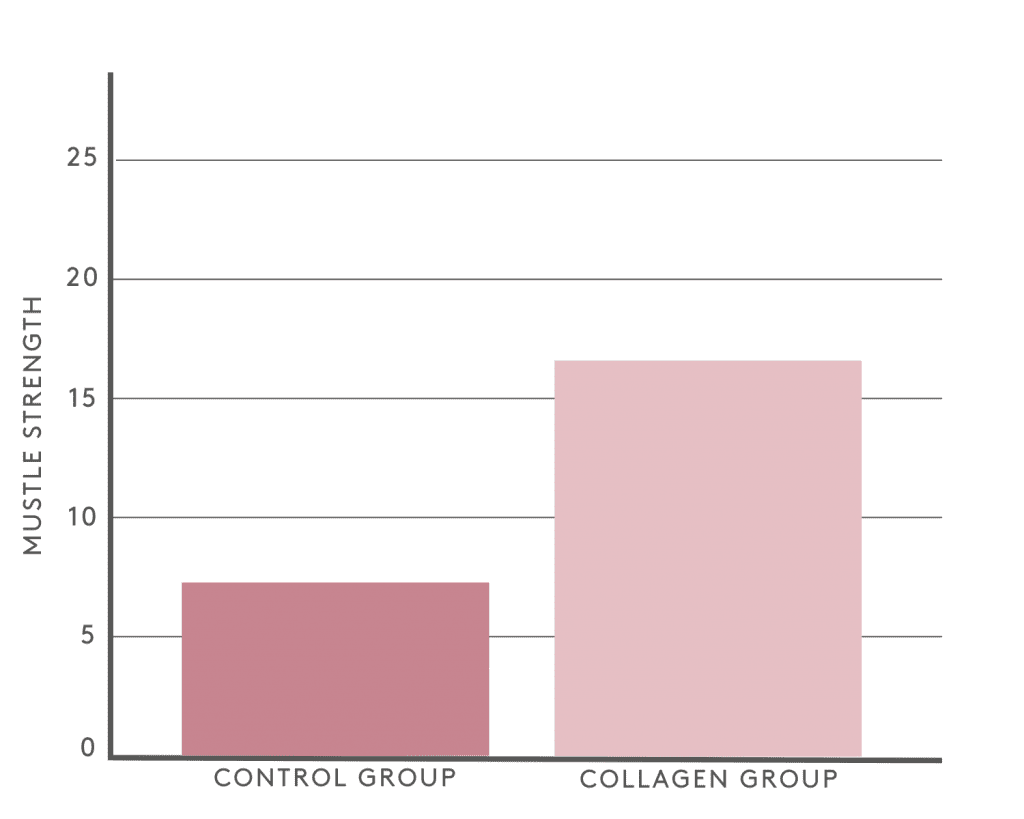As an essential protein that supports skin elasticity, collagen is best known for its benefits on wrinkles. However, this nutrient also provides a whole host of benefits for your fitness routine. From muscle growth to workout recovery, collagen can help.
In this article you’ll find:
- What is collagen?
- The benefits of collagen on exercise
- Should I take collagen before or after a workout?
- Which collagen supplements should I take?
What Is Collagen?
Collagen is a protein found throughout the human body. It makes up between 25-35% of our whole-body protein content. Collagen provides strength and support to our muscles, bones and skin. This means that it can contribute to firm skin, healthy joints, muscle growth and repair, and strong bones. 1
In around our mid-to-late twenties, production of collagen begins to decline. Initially, this is a small reduction of around 1% per year. However, after the menopause, this increases further, leading to physical signs of age such as skin sagging and wrinkles. Furthermore, symptoms such as joint pain, muscle soreness and dental issues may become more prominent. 2,3
The Benefits Of Collagen On Exercise
Collagen Helps To Reduce Joint Pain
Cartilage is composed of around 60% collagen, so boosting collagen levels can support the cartilage health within your joints and protect bones from the high-impact movements often completed during physical activity.
Collagen supplementation has been suggested to improve the function of joints and possibly reduce the degradation of joints. (4) Therefore, implementing a collagen supplement into your fitness regime may improve post-exercise joint pain. It may also enable you to move more freely within your workouts.
Collagen Improves Muscle Mass
As an essential protein that’s found in skeletal muscle, collagen contributes to the maintenance and growth of muscle mass.
Collagen Improves Injury Recovery Time
Following a workout, protein is broken down within the muscles. This is then followed by a period of protein synthesis which is important for enhancing muscle growth. This effect is supported by the ingestion of protein, meaning increased collagen intake following exercise may increase and support muscle growth. This can also improve the repair and recovery of your muscles, leading to less soreness the next day. 5
Collagen Aids Weight Loss
Supplementing with collagen after a workout has been suggested to improve body composition, muscle strength and fat loss. All participants involved in this research experienced these results over the course of a 12-week training programme. However, those who were supplementing with collagen showed a significantly more pronounced effect in comparison to those who were not. 6

(Zdzieblik et al, 2015 [6])
While dietary sources of collagen such as bone broth and meat can help maintain levels, the decline of natural collagen as we age suggests a demand for other sources of this essential protein. Supplementation can help boost collagen levels further, and support healthy skin, bones, joints and muscles throughout the years.
Should I Take Collagen Before Or After A Workout?
You can take collagen at any time of the day to top up your levels. However, studies show that the high amino acid content of collagen makes it a great addition to your post-workout routine. We’d recommend trying your supplement at different times to find the best one for you.
Which Collagen Supplements Should I Take?
The Myvitamins collagen range boasts a variety of options to suit every individual:
- Collagen Powder: An expert blend of type I and type III collagen, available as an unflavoured, grape, or peach tea flavoured powder. This convenient supplement provides 20g of hydrolysed collagen peptides per serving, perfect for adding into shakes, smoothies or bakes.
- Collagen Gummies: Prefer to take your supplements in a tasty pomegranate gummy form? These juicy gummies contain 500mg of marine collagen, along with 1200ug of retinol and 100% of your daily recommended vitamin C intake.
- Collagen Pancakes: 20mg of hydrolysed collagen peptides and MCT (medium-chain triglyceride) powder in a gluten-free pancake mix. This mix is the perfect pre-workout breakfast option to help support muscle growth and joint health. MCT powder has also been suggested to produce ketones as an alternative energy source used by your muscles during exercise, while also aiding in the management of body weight. 8
- Plant Collagen: A vegan-friendly option, containing a unique blend of proline, glycine and hydroxyproline (the amino acids that make up collagen) to mimic the effects of bovine collagen. To further boost these effects, vitamin C, zinc and copper are included to increase collagen production and support both the beauty and fitness benefits of this powerful mix. 9

